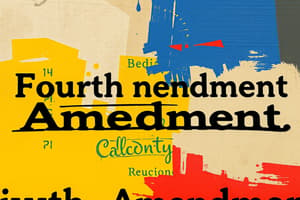Podcast
Questions and Answers
What is the primary function of the Legislative Branch as outlined in the Constitution?
What is the primary function of the Legislative Branch as outlined in the Constitution?
- Approving judicial appointments
- Enforcing laws
- Interpreting laws
- Making laws (correct)
Which branch of government is tasked with approving presidential nominations according to the Constitution?
Which branch of government is tasked with approving presidential nominations according to the Constitution?
- Judicial Branch
- Legislative Branch (correct)
- State Governments
- Executive Branch
How does the Constitution prevent any single entity from amassing too much power?
How does the Constitution prevent any single entity from amassing too much power?
- By giving the military ultimate authority
- By establishing a system of checks and balances (correct)
- By allowing the Supreme Court to overrule all legislation
- By allowing the President to veto all legislative decisions
What is a key characteristic of civics education as highlighted in the text?
What is a key characteristic of civics education as highlighted in the text?
In what way does the Constitution contribute to modern civics education?
In what way does the Constitution contribute to modern civics education?
What online resource is mentioned in the text as providing interactive and engaging civics lessons?
What online resource is mentioned in the text as providing interactive and engaging civics lessons?
What is the main responsibility of the Executive Branch in the United States government?
What is the main responsibility of the Executive Branch in the United States government?
Which right is NOT protected by the Bill of Rights in the United States Constitution?
Which right is NOT protected by the Bill of Rights in the United States Constitution?
What is the purpose of action civics projects mentioned in the text?
What is the purpose of action civics projects mentioned in the text?
What is one way individuals can become engaged in civics according to the text?
What is one way individuals can become engaged in civics according to the text?
Which branch of government is responsible for interpreting laws and resolving disputes?
Which branch of government is responsible for interpreting laws and resolving disputes?
Why is understanding the Constitution essential for developing a strong foundation in civics education according to the text?
Why is understanding the Constitution essential for developing a strong foundation in civics education according to the text?
Flashcards are hidden until you start studying
Study Notes
Cultivating Civics Through the Constitution
In the realm of civic education, one of the most vital documents shaping our democracy is the United States Constitution. This essential text has provided the framework for our government, ensuring that we uphold the values of liberty, justice, and equality. Let's explore various aspects of the Constitution and its impact on modern civics education.
Foundations of American Democracy
The Constitution is a foundational document for understanding American democracy. It outlines the structure and functions of our government, detailing the roles of the executive, legislative, and judicial branches, as well as the relationship between the federal government and the states.
Learning the Constitution
Civics education is not just about memorizing historical documents but also about developing critical thinking and debate skills, as well as strong civic virtues. To aid in this process, numerous resources and tools exist, including websites like iCivics that offer interactive and engaging lessons.
The Three Branches of Government
The Constitution established a system of checks and balances, creating three branches of government to prevent any single entity from amassing too much power. This system includes:
- The Legislative Branch, consisting of the House of Representatives and the Senate, which makes laws and approves presidential nominations.
- The Executive Branch, led by the President, who enforces laws and serves as the commander-in-chief of the military.
- The Judicial Branch, composed of the Supreme Court and lower courts, which interprets laws and resolves disputes.
The Bill of Rights
The first 10 amendments of the Constitution, known as the Bill of Rights, detail the civil liberties and freedoms that all Americans are entitled to. These rights include:
- The freedom of speech, religion, and the press.
- The right to bear arms and to assemble peaceably.
- The protection against unreasonable searches and seizures.
- The right to a speedy trial and due process.
- The protection against cruel and unusual punishment.
- The right to a jury trial in criminal cases.
Civic Engagement and the Constitution
The Constitution serves as a touchstone for civic engagement, providing the blueprint for how citizens can participate in the democratic process. Some ways to become engaged in civics include:
- Learning about the Constitution and its amendments.
- Participating in local, state, and national elections.
- Contacting elected officials to voice concerns and opinions.
- Serving in local government or on a school board.
- Volunteering in community organizations.
Action Civics
In addition to traditional civics education, action civics projects equip students with the tools to address local community issues and engage in the democratic process. These projects require students to:
- Examine local community issues.
- Refine the topic.
- Research public policy solutions.
- Build consensus.
- Reach out to community partners and representatives.
- Engage in civic action to advocate for their policy proposal.
Conclusion
Understanding the Constitution is essential for developing a strong foundation in civics education. By learning about the Constitution and other key civics concepts, individuals can improve their ability to engage in the democratic process, participate in civic life, and become involved in their communities. Ultimately, these endeavors help foster a more informed and engaged citizenry, ensuring the vitality of our democracy.
Studying That Suits You
Use AI to generate personalized quizzes and flashcards to suit your learning preferences.




